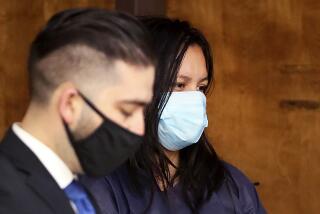Mother Who Killed 2 Sons Enters Plea
- Share via
ATLANTA — A Georgia woman who was charged with murder after fatally shooting two adult sons suffering from Huntington’s disease pleaded guilty Wednesday to a lesser charge of assisting a suicide, ending a case that drew national attention to the ravages of the disease and prompted debate over the permissible bounds of motherly love.
Under the plea entered in Spalding County Courthouse, 64-year-old Carol Carr will serve up to five years in state prison for violating a law that prohibits aiding in a suicide. It was one of the first such convictions in Georgia.
In exchange, county prosecutors agreed to drop murder charges against Carr, who turned herself in June 8 after shooting her terminally ill sons, Randy Scott, 42, and Andy Scott, 41, as they lay in a nursing home in the town of Griffin, about 40 miles south of Atlanta. The two were in the advanced stage of the degenerative disease.
Carr, who has been held without bail since her arrest, will be eligible for parole in about a year. She had faced the possibility of life in prison if convicted at trial on murder charges that were handed down by a Spalding County grand jury in August.
The case was “difficult from everyone’s perspective,” said Spalding County Dist. Atty. William T. McBroom. “You have a woman that never has done any kind of criminal act. She’s 64 and has health problems. But she’s killed two people. You can’t condone that and let her go.”
McBroom said a trial could have ended with a hung jury if one or more jurors had sympathized with Carr. But he said Carr also risked spending the rest of her life behind bars by facing a jury. “Both sides gave up something,” the prosecutor said of the plea agreement.
“It’s a classic example of the old legal adage that you should always temper justice with mercy,” Carr’s lawyer, Lee Sexton, said after a court session. “She believes she was 100% right -- it was her duty. But legally, she knew it violated the law.”
The case underlined the toll exacted on patients and their loved ones by Huntington’s disease, a hereditary brain disorder that erodes a person’s ability to perform basic functions, such as walking, speaking or even thinking clearly, and in the end proves fatal.
Carr provided a particularly poignant symbol. Her husband, Hoyt, died of Huntington’s in 1995 after a long struggle. A third son, James Scott, 38, is showing early signs of the disease. The disease had also struck the husband’s mother, along with a sister and brother.
“We are heartened that Mrs. Carr will not have to face a trial for the murder of her two sons who suffered from Huntington’s disease,” said Barbara Boyle, national executive director and CEO of the Huntington’s Disease Society of America. She urged caregivers facing severe pressures to contact the society.
During grand jury hearings on the matter last year, supporters gathered at the courthouse to urge authorities to have mercy on Carr, who went to SunBridge Care and Rehabilitation and shot both sons in the head with a .25-caliber handgun.
Carr had vowed she would not let the two sons succumb in the same manner as her husband. She had once had helped feed the two sons handfuls of anti-anxiety pills in an unsuccessful attempt to end their lives.
Sexton said he hoped the case would inspire Georgia lawmakers to legalize assisted suicide in cases of Huntington’s disease. Carr was “extremely relieved that she’s no longer facing murder charges,” Sexton said. “There’s an end to what she’s going through today.”
More to Read
Sign up for Essential California
The most important California stories and recommendations in your inbox every morning.
You may occasionally receive promotional content from the Los Angeles Times.









